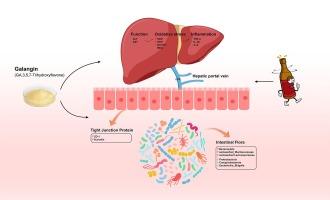高良姜素通过调节肠肝轴缓解酒精性肝病
IF 3.8
2区 农林科学
Q2 FOOD SCIENCE & TECHNOLOGY
引用次数: 0
摘要
饮酒引起的肠道微生物群生态失衡会破坏肠肝轴,导致酒精性肝病(ALD)的发生和发展。本研究调查了高良姜素(GA)在酒精诱导的小鼠 ALD 模型中对肠道-肝轴的影响,重点研究其调节肠道微生物群组成、肠道通透性和肝脏炎症的潜力。结果表明,GA干预可减轻肝脏氧化应激损伤和炎症,改善肠道微生物群失衡,通过上调紧密连接蛋白的表达来调节肠道通透性,并增强肠道屏障功能。天麻治疗减轻了肝脏氧化应激和炎症,纠正了酒精引起的菌群失调,并通过上调紧密连接蛋白增强了肠道屏障。此外,GA 对 ALD 的改善主要与细胞色素 P450 和谷胱甘肽代谢途径对异生物的代谢有关。这些结果表明,GA 可通过调节肠道-肝脏轴的异常来缓解 ALD。本文章由计算机程序翻译,如有差异,请以英文原文为准。

Galangin alleviates alcoholic liver disease by regulating the gut-liver axis
The imbalance of gut microbiota ecology caused by alcohol consumption disrupts the gut-liver axis, leading to the occurrence and progression of alcoholic liver disease (ALD). This study investigates the effects of galangin (GA) on the gut-liver axis in an alcohol-induced mouse model of ALD, focusing on its potential to regulate gut microbiota composition, intestinal permeability, and hepatic inflammation. The results showed that GA intervention alleviated liver oxidative stress injury and inflammation, improved gut microbiota imbalance, regulated intestinal permeability by up-regulating the expression of tight junction proteins, and enhanced intestinal barrier function. GA treatment reduced liver oxidative stress and inflammation rectified, alcohol-induced dysbiosis, and bolstered the intestinal barrier by up-regulating tight junction proteins. Additionally, the improvement of ALD by GA is mainly related to the Metabolism of xenobiotics by cytochrome P450 and Glutathione metabolism pathways. These results suggest that GA may alleviate ALD by regulating abnormalities of the gut-liver axis.
求助全文
通过发布文献求助,成功后即可免费获取论文全文。
去求助
来源期刊

Journal of Functional Foods
FOOD SCIENCE & TECHNOLOGY-
CiteScore
9.60
自引率
1.80%
发文量
428
审稿时长
76 days
期刊介绍:
Journal of Functional Foods continues with the same aims and scope, editorial team, submission system and rigorous peer review. We give authors the possibility to publish their top-quality papers in a well-established leading journal in the food and nutrition fields. The Journal will keep its rigorous criteria to screen high impact research addressing relevant scientific topics and performed by sound methodologies.
The Journal of Functional Foods aims to bring together the results of fundamental and applied research into healthy foods and biologically active food ingredients.
The Journal is centered in the specific area at the boundaries among food technology, nutrition and health welcoming papers having a good interdisciplinary approach. The Journal will cover the fields of plant bioactives; dietary fibre, probiotics; functional lipids; bioactive peptides; vitamins, minerals and botanicals and other dietary supplements. Nutritional and technological aspects related to the development of functional foods and beverages are of core interest to the journal. Experimental works dealing with food digestion, bioavailability of food bioactives and on the mechanisms by which foods and their components are able to modulate physiological parameters connected with disease prevention are of particular interest as well as those dealing with personalized nutrition and nutritional needs in pathological subjects.
 求助内容:
求助内容: 应助结果提醒方式:
应助结果提醒方式:


